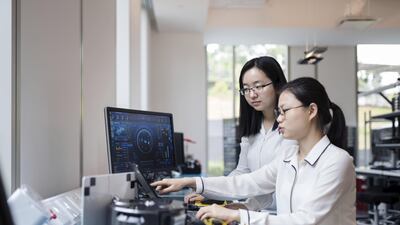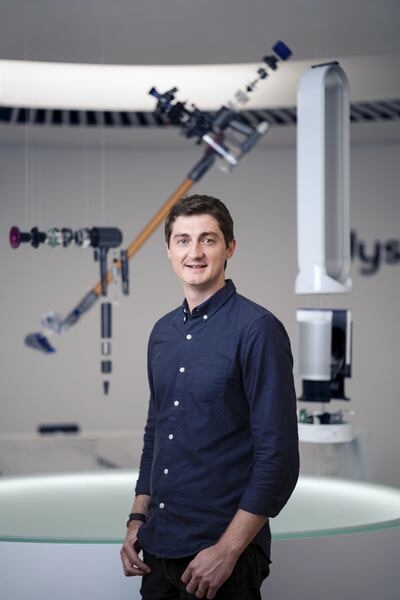Earlier this month, Jaguar Land Rover sounded a warning about the coming revolution in car automation.
Chief executive Ralf Speth said that in the UK alone 250,000 drivers could lose their jobs because of self-driving trucks. This, he warned, could create social turmoil. “What happens to society if they lose their jobs? Who pays for them?”
Mr Speth’s warning follows an experiment in artificial intelligence by Facebook. The social media giant shut down a program when two of their AI chatbots started to communicate with each other in their own language.
Researchers did not shut down the experiment because they were afraid of the results but because they were looking for them to behave in a different way. Nevertheless, both episodes show the potential that automation, artificial intelligence and robotics have to change the world.
A company at the frontlines of robotics and artificial intelligence is Dyson.
Known for its vacuum cleaners, the UK firm also manufactures hair dryers, bladeless fans and humidifiers. It opened a multi-million-dollar technology centre in Singapore last February where engineers are looking at how to use AI to make its machines smarter.
Central to this push is the 360 Eye – a robot vacuum cleaner and a clear example of how AI is going to appear in our homes. For the uninitiated: robotics is the hardware while AI is the software that allows a robot to act intelligently.
The robot comes with a 360-degree camera on top that maps the floor and here comes the AI bit: algorithms allow the robot to decide which is the most efficient way to cover the whole room.
Over time and along with software updates from Dyson, the idea is that the vacuum gets smarter and smarter.
For Scott Maguire, global engineering director at Dyson, automation and robotics is going to be a bigger part of everyone’s life. But only if it’s there to help people have an easier, less burdensome existence.
“We don’t see AI as the spear of changing everything,” he said.
“It’s not just about AI for the sake of AI. We think it’s much, much more nuanced than that in terms of products for them to be useful,” he said of what is being developed at Dyson.
_______________
Read more:
Time to accept the robot revolution
Saudi Arabia's PIF teams up with SoftBank to help regulate robots taking over the world
National Editorial: Don't be afraid of the robots
_______________
Another issue is the question of regulation. How the world is preparing for a world with robots and AI has long preoccupied tech leaders.
Elon Musk, for example, has been a critic of AI and recently, along with others, sent a letter to the United Nations warning about killer robots, a “third revolution in warfare" and urging the UN to act.
The billionaire founder of Space X also has described artificial intelligence as humanity's “biggest existential threat”.
However, Facebook founder Mark Zuckerberg and chess legend Garry Kasparov (famously beaten by a computer Deep Blue in 1997) are more sanguine about AI’s rise.
The question of job losses, meanwhile, is a hard one to quantify. We already see automated check-in desks at airports and payment kiosks in supermarkets.
In January, a McKinsey & Company report said that 30 per cent of tasks in 60 per cent of occupations could be computerised. While a paper published by two US academics last year found that robots are to blame for up to 670,000 lost US manufacturing jobs between 1990 and 2007.
The study also found that these numbers will rise because industrial robots are expected to quadruple.
Even in the UAE, Mashreq Bank said it will cut 10 per cent of its workforce of about 4,000 in the next 12 months as AI and automation become more widespread.
And it’s not just monotonous repetitive jobs such as factory work that’s under threat: computers today can act creatively such as composing music and play sports games.
But for Mr Maguire, automation will create more jobs, more highly-skilled jobs. “We think technology change is fundamentally positive. We also believe it’s good for the job market.”
Despite these sentiments, the world is still a long way from the 15-hour-weeks and life of relative leisure that economist John Maynard Keynes predicted in the 1930s.
If anything, most of us are worker longer hours than ever. Why hasn’t the robot revolution happened sooner?
Companies such as Dyson are investing millions of dollars in research yet a robot servant in every house is still a long way away.
The reasons are many but include the huge cost and the complexity of writing algorithms that allow robots to act intelligently. But some experts believe the future is not about simply replacing humans with robots. Therefore, we may not see a robot servant but will have multiple pieces of technology augmented by AI that will make our lives easier.
“Automation and robotics are not there to replace any humans, which is what everyone talks about and gets worried about. I think it’s much more about helping solve everyday issues that people have,” said Mr Maguire.
Some Dyson products are already integrated with voice services such as Amazon’s Alexa. This makes it easier than using a smartphone app and could offer a glimpse at the future. “The team in Singapore did that,” says Maguire. “With voice integration you can just ask so it makes it much less onerous and it’s much more accessible for everyone. Which is really interesting.”
Professor Lakmal Seneviratne, director of the robotics institute at Khalifa University, also believes that many challenges remain before we see mass automation.
“Robotic automation in the real world is very difficult – I mean construction sites, the home and 99 per cent of our day to day interactions,” he said.
“To bring robots into these environments it is extremely difficult and expensive. It makes sense to make robots work with people rather than replace them. It could mean less workers but better paid workers,” referring to it as the fourth industrial revolution.
While Prof Seneviratne believes robotics and AI will largely be positive for the world, concerns about jobs should be not be dismissed and governments and authorities must prepare.
“The people who talk about job losses need to be listened to,” he said.
We need to develop policies and practices to mitigate any detrimental effects.”



